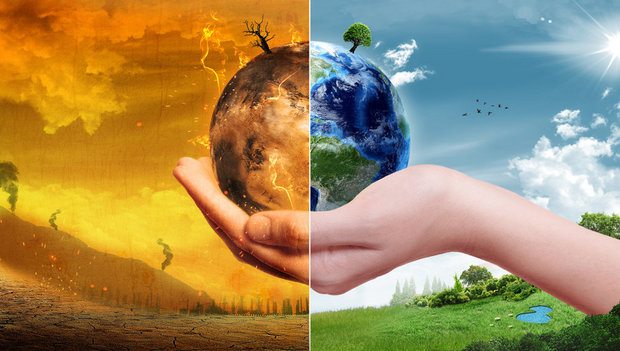Since generations, global warming has been an active topic of interest for school children and occasionally, a few adult groups. Nonetheless, despite being aware of the pros and cons of climate change, we still continue to debate on the topic. Why? Have we not heard fables about the Great Flood and other myths that have emanated from histories across the world? The need of the hour is not to debate in a well-sheltered, temperate-controlled room with a bunch of scholars, but the need is to drive the change through our actions.
Fortunately for humanity, it is not too late as of yet. The worst part is yet to come and it’s time to act now. Because if we delay action further, there will come a time when nothing can be molded anymore. The repercussions of climate change are harmful and can be visualized like a domino. When one element of nature is affected, it trickles down to disturb the perfect harmony of nature in a disproportionate and harmful manner. Below are a few cases, which can lead to a sudden upsurge in health-related emergencies, since the human body is the first and foremost part that is affected due to extreme climatic changes.
- Extreme heat: For tropical countries such as India, more than cold, heat is a major cause of concern. According to the National Crime Bureau, over 20,000 people have died since 1990 due to heat strokes. On average, even today, 1000 people die each year due to extreme heat conditions. Dehydration and heat stress can sometimes prove to be fatal too.
- Air Quality Index: Air pollution is another growing concern especially in India. In addition to contaminated air being released by factories, firecrackers and non-adherence to regulatory emission tests are other factors that contribute to the current AQI. The AQI is recorded at a 2.5 Particulate Matter, which indicates the presence of harmful particles in the air. These can result in asthma or other chronic respiratory diseases. Sometimes, it can also result in cardiovascular and other heart-related disorders.
- Melting Water Caps: The melting Arctic caps are another cause of distress especially for island countries as well as continents. The aquatic life also gets affected to climate change, for example the corals and fish that are washed ashore each day on innumerable coasts of India. Once the exorbitant amount of water bodies overflow, water-borne illnesses will also skyrocket leading to an increase in medical emergencies.
- Safety & Availability of Food: During extreme climatic conditions, safety and availability of food will be a major concern as well. Climate change directly affects Earth’s cycles and this imbalance leads to seasonal changes. If the water cycle changes, then it directly affects our production capabilities, which can further lead to famine or drought.
- Vector Borne Diseases: Due to extreme climatic conditions, vector-borne diseases transmitted by mosquitoes, flees or other insects will also be expected to swell. A decrease in food storage can lead to the consumption of other organisms. This can prove to be fatal since it can lead to unforeseen diseases such as flu, plague, as well.
There are also other phenomena resulting out of climate change, such as Frozen Rain. Frozen Rain occurs when rainwater comes in contact with a temperature that is below the freezing point. This leads to droplets solidifying as soon as they come in contact with the Earth. It can prove to be very dangerous, as it can be used to stab, puncture or harm others, imagine if it rained swords? That’s what frozen rain feels like and it’s already occurring in several Western countries.
Thus, global warming is no more a distant phenomenon; the effects are visible and growing. At this rate, it’s only about time that the ozone layer will get depleted and there will remain no protection from Ultra Violate rays for us. It’s important to realize the ways in which we can contribute, by saving water, making the best use of renewable energy, reforestation as well as investing in healthcare, so that when we grow old, we are not left guilt or lonely, but instead make way for the next generations to live and thrive.


